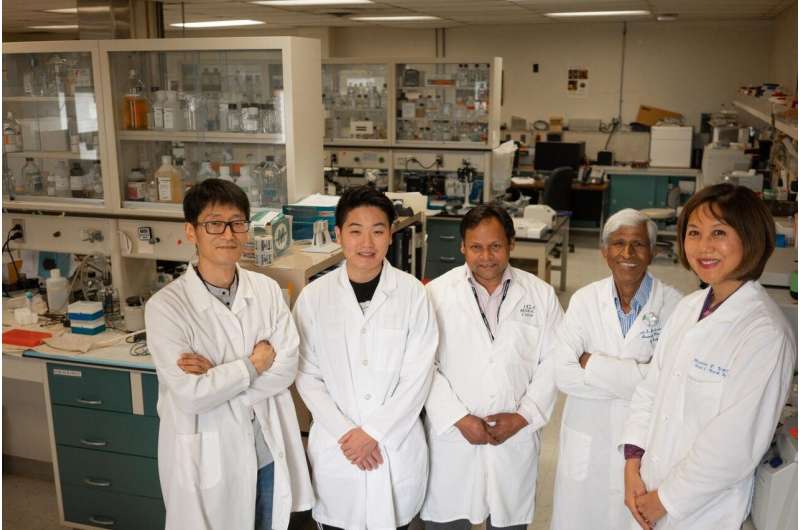Botanical drug is shown to help patients with head and neck cancers

In a UCLA-led phase I clinical trial, a new plant-based drug called APG-157 showed signs of helping patients fight oral and oropharyngeal cancers. These cancers are located in the head and the neck.
APG-157 is made up of multiple compounds produced by plants, including curcumin. UCLA Jonsson Comprehensive Cancer Center researchers found that treatment with this botanical drug resulted in high concentrations of curcumin and its byproducts circulating in the blood and absorbed by tumor tissues within three hours after being taken orally.
APG-157 reduced the concentration of cytokines—proteins involved in inflammation—in the saliva when administered to cancer patients. The therapy also reduced the relative abundance of Bacteroides species, a group of gram-negative bacteria. Gram negative refers to a group of dangerous bacteria that have an outer layer which hides them from the immune system. The relative abundance of gram-negative bacteria compared to the presence of other types of bacteria is correlated with oral cancer.
APG-157 also resulted in the expression of genes that are associated with attracting immune system T cells to the tumor area. This therapy could have a beneficial effect when used in combination with immunotherapy drugs that help immune system T cells recognize and kill tumors.
The treatment did not have any adverse effects on the study's participants.
Cancers of the head and neck account for 4% of all cancers. About 650,000 new cases are reported each year around the world. People with advanced head and neck cancers have a low survival rate and current treatment options such as surgery, radiation and chemotherapy can have adverse effects. Therefore, more effective and less toxic therapies are needed to help improve the quality of life and outcome for those with these cancers.
APG-157 is a botanical drug developed under the FDA's Botanical Drug Guidance, which includes requirements for production of plant-based therapies that are marketed as prescription medications. The drug is made up of botanical compounds including curcumin from the Curcuma longa plant, which is commonly referred to as turmeric and is a member of the ginger family.
Curcumin is one of the medicinally active or therapeutic molecules that has been tested as a possible treatment to help fight multiple cancers because it is an antioxidant that reduces swelling and inflammation. However, there is poor absorption into the bloodstream when curcumin is taken orally. In this study, UCLA researchers found that when APG-157 is taken through oral mucosal absorption, patients have high levels of curcumin circulating in their blood and absorbed by cancer tissues.
UCLA researchers conducted the study of APG-157 comparing 12 people who had oral and oropharyngeal cancer with a control group of 13 people who did not have cancer. The reason both the people with cancer and without cancer were part of the study was to show that the drug was not toxic to either people with cancer or those without cancer.
The medication was given each hour for three hours and was delivered as a lozenge that slowly dissolved in the mouth. Blood and saliva samples were collected beforehand—each of the three hours the medication was administered—and 24 hours after the last dosage. The medication was given to 12 people (some who had cancer and some who did not) and a placebo was given to 13 people. Blood and electrocardiogram tests did not show increased toxicity in the people who took the active medication in comparison with the people who took the placebo, regardless of whether they had cancer or not.
For the cancer patients who took the medication, there was a decrease in Bacteroides and an increase in T cells in the tumor tissue as compared to cancer patients who took the placebo. Neither the subjects nor the investigators knew whether the drug or a placebo was given when reviewing the blood and saliva test results of the blinded study.
APG-157 is a botanical drug that has low toxicity. It works effectively to reduce inflammation that contributes to the growth of cancer cells. It also attracts T cells to the tumor micro-environment. When used in combination with immunotherapy drugs, APG-157 might have the ability to make the immune system more effective in attacking head and neck cancers. With potential to inhibit the growth of Bacteroides species, APG-157 could also improve cancer therapy through oral microbial changes.
More information: Saroj K. Basak et al, A randomized, phase 1, placebo‐controlled trial of APG‐157 in oral cancer demonstrates systemic absorption and an inhibitory effect on cytokines and tumor‐associated microbes, Cancer (2020). DOI: 10.1002/cncr.32644


















